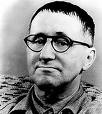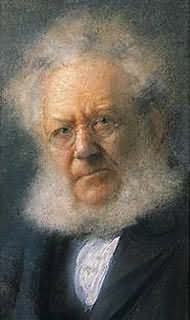Modern and Contemporary Drama: ENG 3433
This class offers a selection of modern and
contemporary drama, which represents the social and political changes that
excited the world in the 19th century, and which would continue until our day.
 These
dramas varied significantly from various "-isms"; that is, from Realism to
Naturalism, Expressionism, Symbolism, and toward the Epic Theatre of Brecht, and
the Absurdist drama of Beckett.
These
dramas varied significantly from various "-isms"; that is, from Realism to
Naturalism, Expressionism, Symbolism, and toward the Epic Theatre of Brecht, and
the Absurdist drama of Beckett.
Theatre represents the most censored of all artistic forms, and one that represents most completely the composite of all other creative endeavors--visual art, music, literature--as well as social and political change. While the zoologist Aristotle praised it as the greatest endeavor of humanity, Plato banned it from his Republic; the Church condemned it, the Puritans of England shut it down after decades of opposition, the Enlightenment feared it, and even the early American colonies forbad it within their new Republic. Theatre responds most immediately to social and political change, representing a voice of opposition, of affirmation, or a reflection of civil unrest.
History teaches us that in moments of crisis, the theatre survives, flourishes, and influences society. In the tensions of 5th century Greece, tragedy arose, in the tensions of Renaissance Europe, Marlowe, Shakespeare, Jonson, Webster, and Ford gave voice to that tension; within the many revolutions in Europe in the 19th century, Ibsen, Strindberg, and Gorki and others gave voice to the personal, changing opposition to the status quo, and in post-World War I, such figures as O'Neill, the father of American drama, while Williams, Miller, and others would restate the tensions of the past and keep current with the political turmoil of the present--from experiments with socialism in America to the sudden arise of the reactionary feelings and dealings that gave rise to the McCarthy era and the House on Un-American Activities Committee, with such figures as Miller giving us The Crucible, a modern drama on the puritanical witch trials of Salem and 17th century America.
Drama creates an immediate impression, reacts to the
social and political events about it, and offers observation, defiance, and even
suggestions
 as
to how to change those societal structures. From the rebellions in 19th
century Europe, the British/Irish dilemma and the "Troubles" that reflect
generations of conflict, to the American experience that has more warts than
attributes, drama has been there. Capitalism has become the most immediate
"-ism," one that suggests that tension, adversarial conflict, and false promises
infuse the American experience at the expense of its citizenry believing
otherwise, reflected, for instance, in the post-Viet Nam plays.
as
to how to change those societal structures. From the rebellions in 19th
century Europe, the British/Irish dilemma and the "Troubles" that reflect
generations of conflict, to the American experience that has more warts than
attributes, drama has been there. Capitalism has become the most immediate
"-ism," one that suggests that tension, adversarial conflict, and false promises
infuse the American experience at the expense of its citizenry believing
otherwise, reflected, for instance, in the post-Viet Nam plays.
Whether one agrees or disagrees, drama remains an insightful and "insiteful" element of creativity, meant to disrupt, question, challenge, and cause change in society and especially its political systems. One learns from the modern drama what politics, philosophy, or social systems mean, and how they limit, define, or blind people into easy acceptance of what these dramatists and their works view as impeding humanity's growth, security, or duplicity in evil constructs.
The genre remains a fascinating journey, one begun millenniums ago, yet as instructive and vital as ever. Modern drama deals less with mythology and explanations of how and why humanity acts as it does as to tell us why we're in desperate need of change--people have become lulled into a false sense of what's right, wrong, or "correct." The drama challenges that assertion, in its many and various forms, insisting that we've been fooled, whether by government, religion, or our understanding of family, environment, or personal decisions.
 The
modern drama does not purport to be easy; it insists on a greater understanding
of all things pertinent to modern humanity and its relationships to religion,
societal order, psychology in order to appreciate its message; however, it
critically acknowledges that most of us remain ignorant to all the former.
Thus, the drama instructs, irritates, challenges, and begs for intelligence in
order to gain from its message. It remains didactic, combined with
pleasure, but always wishing to challenge the current notions of authority.
The
modern drama does not purport to be easy; it insists on a greater understanding
of all things pertinent to modern humanity and its relationships to religion,
societal order, psychology in order to appreciate its message; however, it
critically acknowledges that most of us remain ignorant to all the former.
Thus, the drama instructs, irritates, challenges, and begs for intelligence in
order to gain from its message. It remains didactic, combined with
pleasure, but always wishing to challenge the current notions of authority.